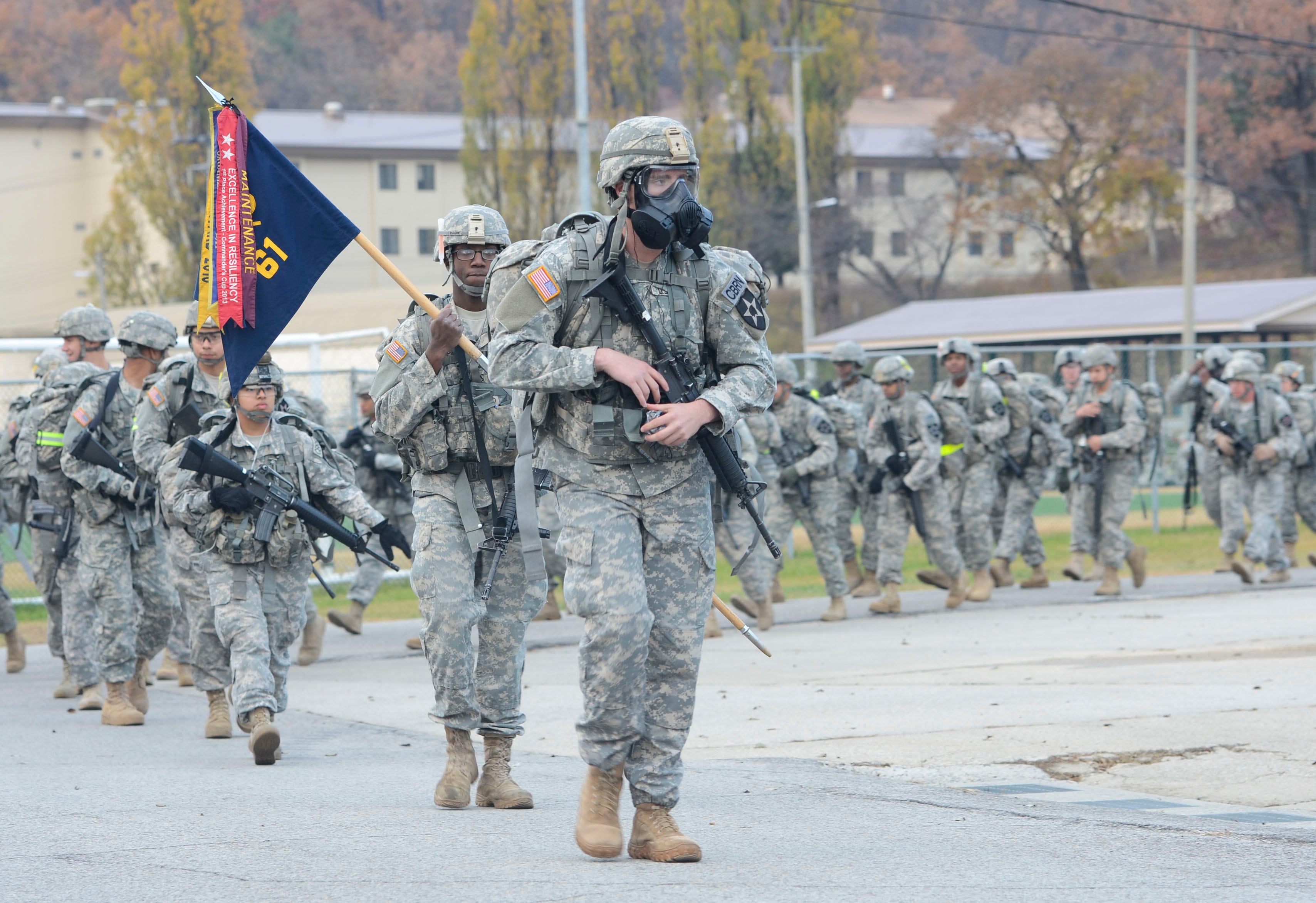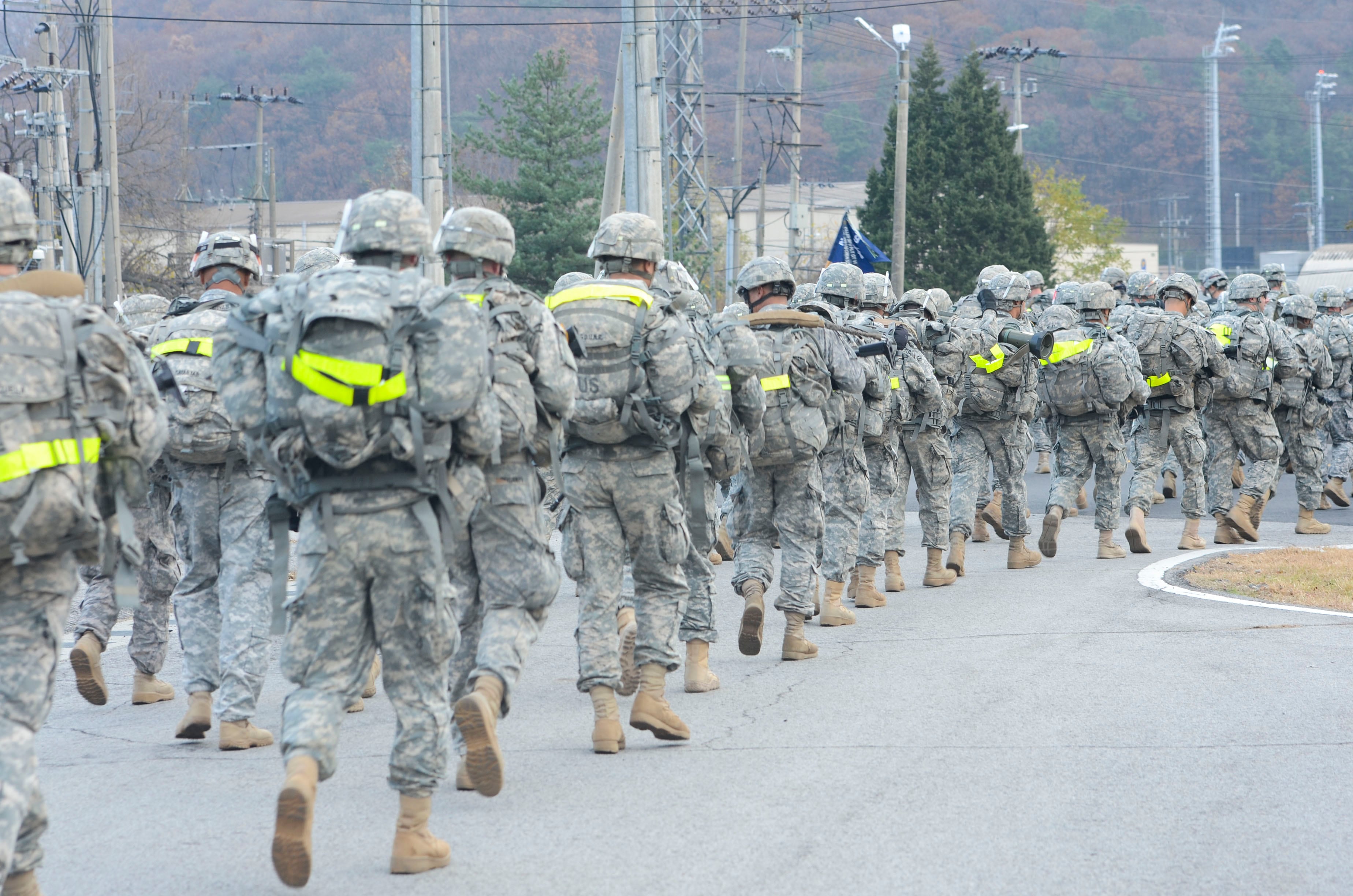When he set out on his first Manchu Mile, Pvt. JaMarcus Walker did not expect the terrain ringing Camp Casey, South Korea, to be so punishing.
"It was the hills that got me," Walker said, laughing at the memory. "I didn't realize how steep they would be."
But the young soldier, who is a human resources specialist with 2nd Battalion, 9th Infantry Regiment, completed the 25-mile march, and is now gearing up for his second go at the storied event.
On Wednesday, Walker will be among more than 1,200 soldiers and veterans who are expected to step off for what will be the final Manchu Mile. Second Battalion, 9th Infantry and its parent unit, 1st Brigade Combat Team, 2nd Infantry Division, will inactivate this summer as part of a wider Army reorganization.
"I completed one of the greatest road marches in the Army's history as a young soldier," Walker said. "I'm only a PV2 and now I'm also going to be part of the last one in Korea."

The Manchu Mile is a grueling 25-mile trek inspired by a longer historic march and ensuing battle.
Photo Credit: 1st Armored Brigade Combat Team
The Manchu Mile takes its name from an 85-mile forced march undertaken by soldiers from the 9th Infantry Regiment during the Chinese "Boxer Rebellion" in 1900, according to information from the Army. The soldiers marched from Taku Bar to the city of Tientsin, where they immediately went into action to help rescue besieged foreign diplomats and missionaries from insurgent Boxers, according to the Army.
The regiment would later earn the honorary title "Manchus."
Twice a year, soldiers from the 9th Infantry Regiment have conducted Manchu Mile marches to build unit cohesion and celebrate the unit's lineage — and despite its name, the Manchu Mile is actually a 25-mile road march.
When 2nd Battalion inactivates later this year, the only remaining 9th Infantry Regiment unit in the Army today will be at Fort Carson, Colorado, according to information from 1st BCT, 2nd Infantry.
"It's bittersweet," said Lt. Col. Scott Knight, commander of 2nd Battalion, 9th Infantry Regiment. "It's the last Manchu Mile on the peninsula. I'm just very proud to have been part of this battalion and to be part of the execution of its last Manchu Mile."
The Manchu Mile is physically and mentally challenging for soldiers, but it also builds cohesion and esprit de corps, Knight said.
Soldiers who successfully complete the march will earn the distinctive Manchu belt buckle, the only unit belt buckle authorized for wear by the Department of the Army, he said.
"It's bragging rights," Knight said. "You'll be surprised how strong the desire is to complete [the march], from every soldier in the battalion, to earn that belt buckle so they can wear it with pride for the rest of their military service … and be part of that legacy."
Soldiers in 2nd Battalion road march every Tuesday, said Command Sgt. Maj. Robert Cobb, the battalion's senior enlisted soldier. The units start with a four-mile march before working their way up every week until they reach 12 miles, he said.
"They'll continue that cycle and carry a little bit heavier load, and they'll move a little bit faster, so when it comes to the Manchu Mile, they're ready for it," Cobb said.
The intent is to have soldiers fit enough to march the distance and still be ready to fight, Cobb said.
"Our predecessors did an 85-mile march, and they didn't sit and rest," he said. "They went straight into a fight."
On Wednesday afternoon, the 1,200 participants in the Manchu Mile will gather at Liscum Field in their kit – this includes their helmet, load-bearing equipment, assigned weapon and 35-pound ruck.
Also joining them will be about 30 veterans of the Korean Augmentation to the United States Army, or KATUSA, program. The program, which has been around since the 1950s, puts Korean troops at all levels of the Army's units, from tank crews to infantry squads to companies and unit staffs. These KATUSA veterans will range in age from 30 to 60, Knight said.
"My first experience on the Manchu Mile, I walked with a 78-year-old KATUSA vet," he said. "It is pretty impressive."
The march itself will kick off at 3 p.m. Wednesday so the participants can escape the heat of the day, Knight said.

Soldiers will take on the challenging Manchu Mile on Wednesday, the last Manchu Mile to be conducted in South Korea.
Photo Credit: 1st Armored Brigade Combat Team
The route of the march takes soldiers from Liscum Field out to the perimeter of Camp Casey, which sits at the bottom of a valley that's ringed with mountains. The soldiers will "get the hills out of the way up front" as they go up and along the ridgeline around the installation, Knight said.
The march then winds its way back to the base and out into the Dongducheon River Valley before circling back through Camp Casey and back onto Liscum Field.
Knight expects the march to take eight or nine hours. At the end, the participants will have a traditional steak and eggs breakfast before a ceremony to award the belt buckle to those who complete the march.
Most of the soldiers will complete the march, Knight said.
"There are very few who actually don't finish," he said.
In November, during the last Manchu Mile, about 15 out of 800 participants didn't finish.
"It's a very high motivation event," he said. "It's a gut check."
The Manchu Mile is, at its core, a team event, Cobb said.
"You have to reach into yourself to complete it, but once we're into this thing, that's when you start looking to your left and right, to your brothers and sisters on either side of you for encouragement. For the individual, it's an accomplishment, but it does so much more for the unit."
Soldiers who have marched a Manchu Mile share a fierce pride in their accomplishment, Cobb said.
"We're deactivating and we're going away, but for the soldiers here, we instill in them that you'll always be a Manchu," he said.
Michelle Tan is the editor of Army Times and Air Force Times. She has covered the military for Military Times since 2005, and has embedded with U.S. troops in Iraq, Afghanistan, Kuwait, Haiti, Gabon and the Horn of Africa.





